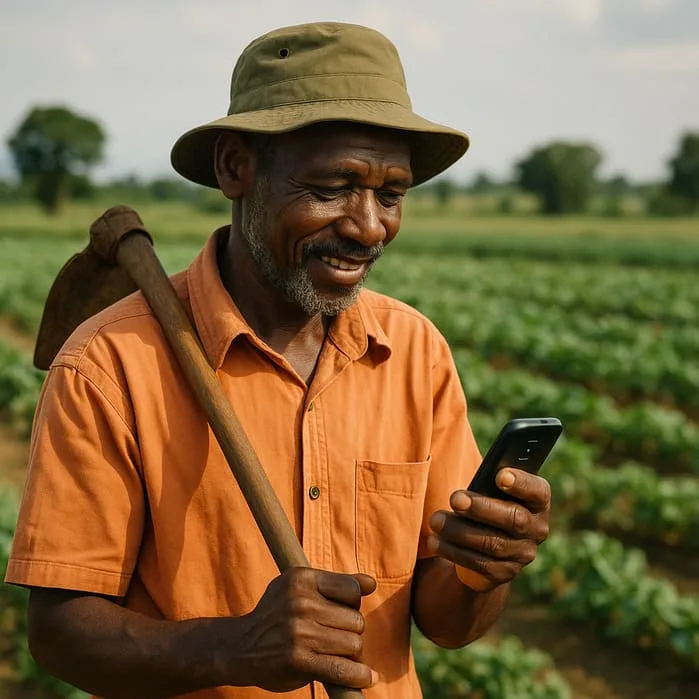Deep in the heart of Kenya’s Meru County , a tomato farmer named David used to throw away nearly half of his harvest. Not because his crops were bad. They were good, red, juicy, and ripe. The problem was simple: he had no clue when or where to sell them. Sometimes middlemen came, offering pennies. Sometimes, no one came. The rest rotted in crates under the sun.

That changed the day David’s cousin showed him how to use his basic phone, not a smartphone, just a Nokia brick, to get real-time market prices via text. Since then, David hasn’t stopped smiling. He now knows where demand is high, how much to charge, and when to pick. He doesn’t call this betting on luck anymore. Now, he’s trading with data.
Phones Are the New Farming Tools
It may sound strange, but in many African villages, the most powerful farm tool isn’t a tractor or a hoe. It’s a phone. And it doesn’t need to be fancy. Even simple phones, no apps, no internet, are helping farmers leap over the usual problems: low prices, bad weather, lack of buyers.
How? Through smart systems built just for them. For example, there are services that send weather alerts in local languages through text. Others connect farmers directly to buyers, skipping the middlemen. One of the most helpful features is mobile money. With tools like M-Pesa in Kenya or MTN Mobile Money in Ghana, farmers can receive payments instantly and safely, without walking for hours to the nearest town.
Why This Matters More Than Ever
In Africa, nearly 60% of people work in farming. Yet many of them live in poverty. Why? Because they often don’t control the price of their crops. They don’t have storage. They don’t have transport. They sell when they’re desperate, not when it makes sense.
But phones are changing that story, especially for women. In places where women couldn’t easily access land or markets, mobile tools are offering them new power. Some apps help them join cooperatives. Some teach them new skills through voice messages, since not everyone can read.
This is about more than tech. It’s about dignity. Farmers who once felt stuck now feel they’re part of something bigger. They know what’s happening in nearby towns. They can call other farmers and ask questions. They can save money and plan ahead.
The New Middlemen: Digital Platforms
It used to be that one or two traders decided how much farmers earned. Now, farmers are working with platforms built for transparency. Think of services like Twiga Foods in Kenya, which connects farmers directly with shops and hotels in cities. Or Hello Tractor in Nigeria, where farmers can rent tractors through a shared system, kind of like Uber for plowing.
Then there’s FarmCrowdy, which brings together small farmers and investors. The investor helps pay for seeds or fertilizer. The farmer does the work. At harvest, both sides share the profit. It’s not just business. It’s a partnership that cuts out waste and builds trust.
Problems Still Linger
Let’s be real. Phones don’t fix everything. In many rural areas, network signals are weak. Some farmers don’t know how to use even basic SMS tools. Electricity is another problem. Charging a phone can take a full day’s walk to a nearby town.
And while mobile money is booming, not every buyer uses it. Some still insist on cash, which brings back the same risks of theft or late payments. Also, scams are real. Some farmers have been tricked into fake deals. Trust takes time.
But these challenges aren’t stopping progress. Across Nigeria, Rwanda, and Ethiopia, farmers are now forming WhatsApp groups to share updates. Some are using voice-based platforms like Viamo, which offers lessons in farming, pricing, and health in over 20 languages.
Looking Ahead: What’s Next?
The future of African farming won’t be built with satellites or AI first. It’ll start with people like David, real farmers using simple phones, making smart moves.
Tech builders across Africa are focusing less on flash and more on fit. What does that mean? Tools that work offline. Voice services for those who can’t read. Local language support. Affordable pricing. Everything built to fit the real-world needs of farmers, not city dwellers with smartphones.
There’s growing interest from global partners, too. From Nairobi to Lagos, local startups are getting support from banks, governments, and even food companies that want better supply chains. Everyone now sees that if farmers thrive, everyone eats better—and the economy grows stronger.